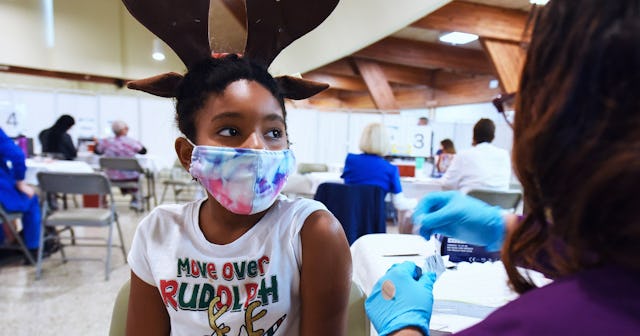Young Kids Have To Wait On Boosters And May Never Need Them At All

The verdict (and data) is still out on whether or not young kids will, or should, get COVID-19 boosters
Since the CDC announced that all adults who want a COVID-19 booster can get one, many are now wondering: Okay, but what about my kids? Many American kids over age 12 got vaccinated back in May 2021 and while Pfizer has asked the U.S. Food and Drug Administration to expand the emergency use of boosters to include children over 16, the rest of the under 16-set is one big question mark. Will kids need COVID-19 boosters? When will they get them? And will they get boosters at all?
So, what’s the deal with kids and COVID boosters?
The main reasons why the booster conversation for kids is still hazy is four-fold: Data on whether vaccine immunity wanes in kids isn’t available yet, kids typically have stronger immune systems than adults, data on whether the booster is safe for kids isn’t avail either, and boosters for kids might be too low in the hierarchy of overall vaccine equity.
Data isn’t available yet on how long vaccine immunity lasts in kids.
Data proved that immunity in adults wanes over time, thus the need for boosters. But the science still isn’t clear if immunity in younger children (who only became eligible for the COVID-19 vaccine at the beginning of November 2021) also wanes over time. Put simply, we don’t know how long the vaccine “works” in kids.
“We don’t know yet if children will need boosters. But we are actively working on the study to answer that question,” said Dr. Flor Munoz, a pediatric infectious disease specialist at Texas Children’s Hospital, one of the sites in Pfizer’s pediatric vaccine trials, told CNN last month. “Data should be available next year.”
Kids do have stronger immune systems than adults.
“Kids’ immunity may last longer and that would mean they may be on a different schedule than the adults, that’s if they need one at all,” said Dr. Claudia Hoyen, director pediatric infection control at UH Rainbow Babies and Children’s Hospital in Cleveland, told CNN.
Dr. Anthony Fauci echoed this last month, too, saying, “it is less likely that [adolescents] will [need boosters], because your healthy, strapping teenagers have a much better and stronger immune response than I do as an elderly person.”
Data on vaccine safety is still being monitored.
Sscientists are monitoring the the 5 to 11 set as they continue to get vaccinated for the first time and CDC Director Dr. Rochelle Walensky said the agency is combing the data for signs of any safety issues, but the information, so far, is promising.
“We haven’t had anything that’s come to us as a signal, and we continue to watch that carefully,” she said at a recent White House Covid-19 briefing.
Does the U.S. even have the bandwidth to distribute COVID-19 boosters to kids if it’s not a priority?
As the U.S. is still struggling to vaccinate and convince the remaining adult population to get vaccinated for the first time, does the U.S. have the bandwidth to embark on another booster rollout when the focus should be on vaccinating the unvaccinated first?
“They don’t want to stress a system that is already stressed to vaccinate another 2.3 million people if they don’t need to,” said Dr. Claire Boogaard, the medical director of the COVID-19 vaccine program at Children’s National in Washington, D.C.
As most thing concerning the COVID-19 pandemic, it seems only time — and more data — will tell.